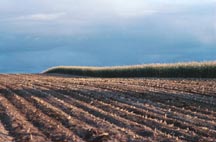|
We at Grinning Planet deny the report that the founder spends one day a month dressed in a Ziggy Stardust costume chasing Martian spiders around the house with a beaker full of rum-and-pineapple bug juice. He LIKES spiders and other natural predators, Martian or otherwise, even if the Green Revolution doesn't have much use for them.
The Green Revolution—which included the widespread introduction of hybrid plant varieties, chemical fertilizers, chemical pesticides, and large, one-crop farms—is given credit for greatly increasing the amount of food that the world can grow within a given amount of land. While the claimed increase in productivity is based in fact, consider the following downsides to the revolution:
- The Green Revolution approach promotes mono-cropping—that is, growing a single crop year after year on the same piece of farmland. This eliminates crop rotation, an important natural approach to maintaining soil fertility and preventing pest problems.
- To make up for the loss of pest protection and soil fertility normally conferred by crop rotation, Green Revolution farmers must use large quantities of chemical pesticides and fertilizers, which kill beneficial pest predators right along with their intended victims, harm the fertility of the soil by killing beneficial soil organisms, and pollute the air and water as wind and rainwater runoff pick up the chemicals and carry them away. Much of the nation's groundwater and surface waters are contaminated by pesticides, nitrate, and phosphate.
- The Green Revolution approach leads to larger and larger farming operations, with fewer and fewer small farms surviving. Also significant is that agribusiness corporations are now major owners in farming operations.
So, overall, the Green Revolution HAS increased farm output, but the price has been high for the environment, for the long-term security of our agricultural land, and for small farmers and farming communities.
Mono-cropping, fertilizers, and pesticides are burning out our soils at the same time the chemicals are poisoning our air and waterways. Insects
 and diseases are becoming resistant to existing pesticides and they're adapting ever more quickly to new pesticides. In the end, we will find that the increased productivity associated with the Green Revolution will have been temporary. Like a person who starts getting hopped up on speed, our current farming system saw an initial period of increased output, but as the side effects of the chemicals take hold, the supporting systems are beginning to falter. After a while, the system is worse off than if the substances had never been used at all.
and diseases are becoming resistant to existing pesticides and they're adapting ever more quickly to new pesticides. In the end, we will find that the increased productivity associated with the Green Revolution will have been temporary. Like a person who starts getting hopped up on speed, our current farming system saw an initial period of increased output, but as the side effects of the chemicals take hold, the supporting systems are beginning to falter. After a while, the system is worse off than if the substances had never been used at all.
Given the long-term unsustainability of Green Revolution farming methods, it is a significant problem that we are continuing to lose our base of small farmers. They, not the large-scale farmers, are the ones who will ultimately be capable of utilizing the sustainable, smaller-scale farming methods that will prove unavoidably necessary in the future.
For the last 50 years, the large agro-chemical companies, aided by their misguided allies in government and by their corporate-funded research partners in universities, have widely promoted adoption of Green Revolution methods because of the profitability of farming supplies and services, large-scale-farming equipment, and commodities brokerage and shipping. They are smart businesses, and they are smart enough to see the writing on the wall for the Green Revolution technologies and products. They've been looking for The Next Big Thing. Enter genetically engineered (GE) crops.
Will GE crops save the world's agricultural systems, or will they add to the problems in the fields at the same time they're adding to the corporate bottom line? Will GE potato fields spawn thousands of freakish genetically engineered Mr. Potato Heads, banding together and marching on town to discover the fate of their friends Larry, Moe and Curly Fries? We'll stick a fork in all that in the next issue of Grinning Planet.
P.S. Hiding your lima beans in your napkin is not a form of crop rotation.
Go to Part 2
Get Grinning Planet free via email
|


